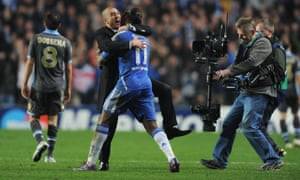My favourite game: Chelsea v Napoli 2012 | Luke McLaughlin | Sport
Eamon Dunphy once described a hectic, high-scoring Premier League encounter as “like watching two drunks fighting in an alley”. He wasn’t being wholly complimentary about that spectacle, but still acknowledged the thrill of seeing two sides cast off any pretence of tactical discipline and go for broke. Dunphy’s phrase came back to me at Stamford Bridge in March 2012. Trailing 3-1 from the first leg in Naples, a 2-0 victory would have sent Chelsea into the Champions League last eight. Walter Mazzarri’s Napoli, playing 3-4-3, arrived aiming to hit on the break.
The context was fascinating. Chelsea’s first-leg defeat hastened the dismissal of André Villa-Boas, lured from Porto less than a year earlier. Roberto Di Matteo took caretaker charge of a battle-hardened team who had hated Villas-Boas’s methods: John Terry, Frank Lampard and Didier Drogba among them. They had an unhappy recent history in the competition, often crashing out in controversial circumstances, complaining bitterly over perceived refereeing injustices.
The first thing I remember is the Napoli fans. Bunched in the opposite corner from where I sat, they were like nothing I’d ever seen or heard. As they sang, chanted and gesticulated in perfect unison, the noise filled the arena. Forced to respond, Chelsea’s fans lifted the energy further, creating an electrifying cacophony that was football’s tribalism at its most thrilling.
Napoli began in the ascendancy. Ezequiel Lavezzi and Marek Hamsik operated in a front three alongside the all-action Edinson Cavani, who should have ended Chelsea’s hopes inside 25 minutes. The Uruguayan hit the side netting after Chelsea were cut open with a lightning counterattack, and wasted a three-on-two soon after. Danger was everywhere for Chelsea but they did not lack determination. Against the run of play, Drogba glanced in Ramires’s whipped cross to send Stamford Bridge into delirium. The Blues believed, even more so after half-time when Terry’s header made it 2-0: 3-3 on aggregate. Advantage Chelsea.
Napoli’s midfield schemer Gökhan Inler soon hit back with a masterpiece of a goal, silkily controlling Terry’s half-clearance on his chest, before drilling a measured half-volley beyond the motionless Petr Cech. The volume emanating from those Napoli ultras rocketed off the charts as the hosts, now needing two, contemplated another painful European departure.

Of course there was more. Andrea Dossena’s handball 15 minutes from time gave Lampard the chance to thump in a penalty, locking the tie at 4-4 overall. Things became increasingly ragged as the players battled to full time in what now resembled a school-playground epic: win possession, attack in numbers, rinse and repeat. Skill levels were high, while defending had become a distant memory as extra time beckoned.
An insanely sharp piece of work by Drogba set up the winner, the Ivorian’s quicksilver turn and cut-back finding the iron-buttocked Branislav Ivanovic – nominally a defender – to deliver the knockout blow. Fittingly, Ivanovic’s shot was all power and little precision, crashing centrally into the roof of the net, leaving Napoli flat on the canvas. “Get in!” yelled Andy Townsend in the commentary box. It was that kind of night.
On several subsequent visits to Naples I’ve come to believe the warmth of the people, the history, and the food and wine combine to create Europe’s greatest city. On their way to the trophy, meanwhile, Chelsea somehow billed themselves as plucky have-a-go heroes rather than the lavishly-funded plaything of a Russian oligarch. They saw off Benfica before Terry’s kick at Alexis Sánchez left them with 10 men at Camp Nou in the semi-finals. They still won. In the final they trailed Bayern Munich, in Munich, before that monstrous Drogba header. The same man slotted the spot-kick that clinched their first European Cup.
But none of it would have been possible without that mad, attritional, punch-drunk night in London. As an elderly Italian fan remarked to me on the walk to the tube station, it had been “molto emozionante”.



